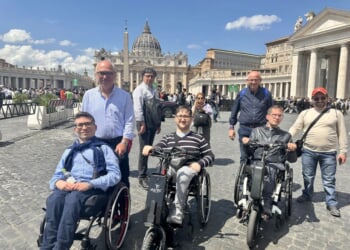The Jubilee Year of Hope was a fitting last year for our late Holy Father, Pope Francis, whose message and evangelization returned to hope so many times throughout his pontificate. Francis was a pope of the people, a man with enormous empathy for the poor and the working class, a leader who sought to lift up the marginalized and the hopeless out of spiritual and material poverty, understanding that physical destitution often contributes to a broken interior life. Pope Francis encouraged meaningful, dignified work in Spes Non Confundit, the Bull which opened the Jubilee:
[Christians should be] working for a future filled with the laughter of babies and children, in order to fill the empty cradles in so many parts of our world. All of us, however, need to recover the joy of living, since men and women, created in the image and likeness of God (cf. Gen 1:26), cannot rest content with getting along one day at a time, settling for the here and now and seeking fulfillment in material realities alone.
Pope Francis saw that the material stress of “getting along one day at a time” actually presents a great temptation to Christians to be more, rather than less, materialistic. When all of one’s thoughts are almost necessarily turned towards the fulfillment of basic human needs, the temptation to view worldly goods as a source of ultimate satisfaction is great. Think of a time when money has been tight—and how hard it is to forget about your situation as you go through the day.
Importantly, Francis stressed that work is important not for the pleasures of wealth, but rather because work allows man and woman to fulfill God’s first command to Adam and Eve in Eden: “Crescite!” (literally meaning the command, “grow!”), “Be fruitful and multiply; fill the earth and subdue it” (Gen. 1:28). Of course, in the most direct sense, this commandment refers to reproduction. But it also orders man to govern and steward Creation and to use the resources of the Earth to sustain and protect himself, as he is the only thing in Creation that builds to survive. Pope Francis put his money where his mouth was—and worked with Cardinal Czerny on a project just outside Rome called Borgo Laudato Si’, an effort to help equip people to work well in an integrated ecological sense.
Francis’ call to active work reflects on every level God the Father’s initial commandment in Eden. In the sense of reproduction, the income generated through work is necessary to support a family. But on a deeper level, work allows us to fulfill our nature by participating in Creation. Humanity, created in the image and likeness of God, is the only species which in turn shapes the world in its own image, reflecting that of the Creator. This is why one’s work must be meaningful. In work well done, a person truly builds something, bringing something good into the world and leading to the benefit of both the individual and society as a whole.
But in the most immediate sense, and the one in which it seems Pope Francis was most interested in, work is good for man because it can be both a product and a source of Hope. This is Hope as a theological virtue—working for the good of others out of a longing for all people to be saved—but more often, this is hope in the more common sense, meaning a trusting desire for a better future. When a person envisions and hopes for a greater fulfillment, hope leads to work, and the fruits of work lead to further hope. As Pope Francis wrote for the workers of Sardinia in 2013, “Hope is creative, it can create a future.”
What is perhaps most inspiring and remarkable about Pope Francis’ assertion of the goodness and dignity of work is not that these statements are in any way novel (Pope Leo XIII, St. Josemaria Escriva, and many others have written prolifically on the dignity of work), but rather that such heartfelt praise of work would come from a man of Pope Francis’ temperament. In that passionate and heartfelt address to the workers of Caglairi, Francis declared that “Where there is no work there is no dignity!” and that “in this system devoid of ethics, at the centre there is an idol and the world has become an idolater of this “god-money.” We must use the talents which God in His infinite wisdom has given us to their fullest extent and do the best we possibly can to further His kingdom on Earth. “God did not want an idol to be at the centre of the world but man, men and women who would keep the world going with their work.”
Pope Francis, operating straight from St. John Paul II’s Love and Responsibility playbook, put the human person at the center of his treatment of work. Francis had a clear understanding of the connection between physical and material poverty, and therefore an ardent desire to help poor men and women from economic exploitation. However, his message of hope through meaningful and active work applies to all people, rich or poor. All people need meaningful work to fulfill the creative aspect of our human nature in the Image of God.
The soon-to-be-canonized Pier Giorgio Frassati serves as an excellent example of this message. Pier Giorgio never wavered from his commitment to the spiritual life and to the active service of others, yet he also strove for professional excellence, dutifully studying to become an engineer even when it went against his natural desires, and was unafraid to voice his political opinions in the turbulent Italian politics of the 1920s. Let us follow in Pier Giorgio’s footsteps, never falling into the worship of money, but remaining full of hope as we work toward true charity.
Photo by Ágatha Depiné on Unsplash















